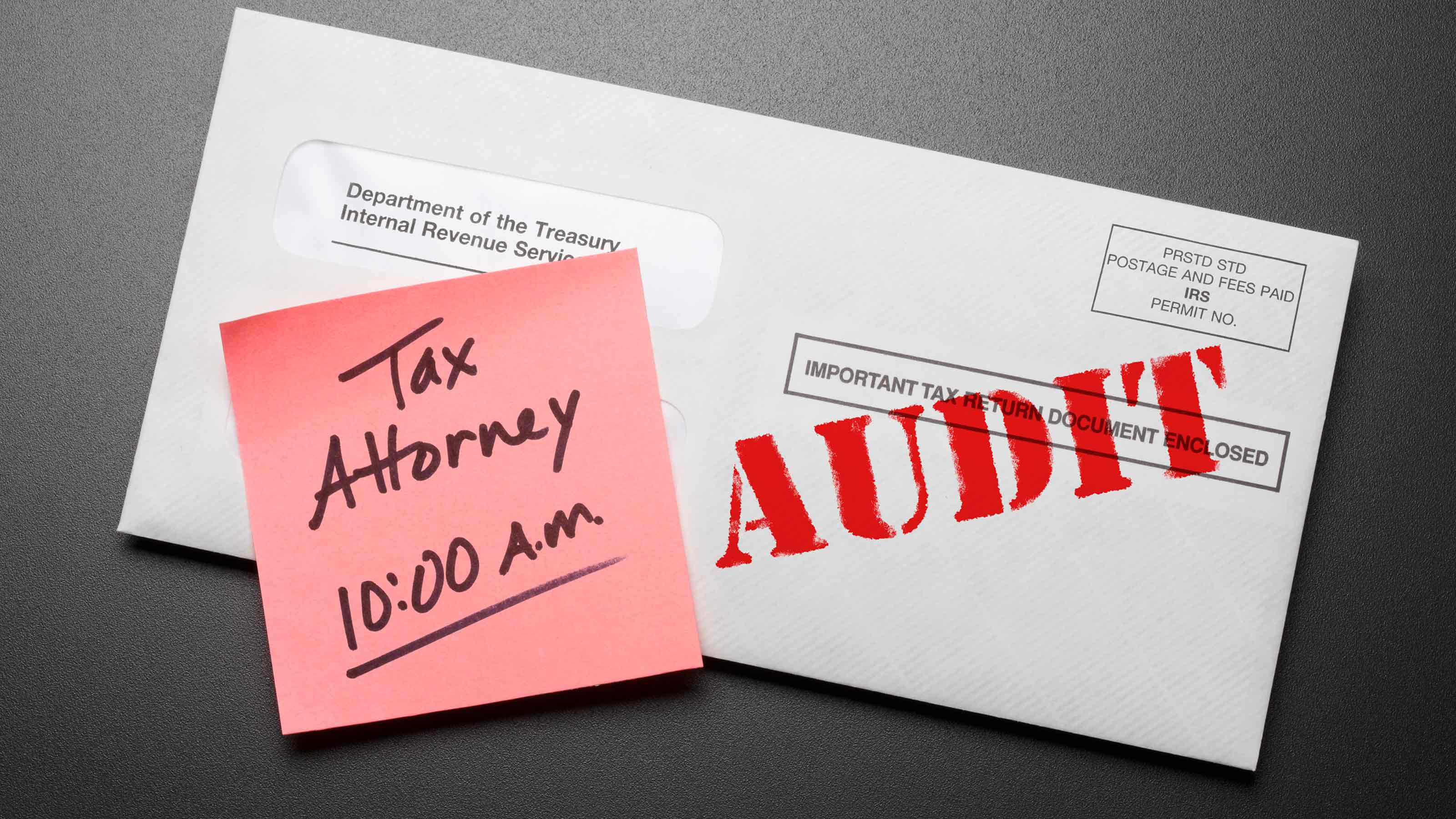9 IRS Audit Red Flags for Retirees
Retirees don't completely escape the IRS audit machine.


Profit and prosper with the best of Kiplinger's advice on investing, taxes, retirement, personal finance and much more. Delivered daily. Enter your email in the box and click Sign Me Up.
You are now subscribed
Your newsletter sign-up was successful
Want to add more newsletters?

Delivered daily
Kiplinger Today
Profit and prosper with the best of Kiplinger's advice on investing, taxes, retirement, personal finance and much more delivered daily. Smart money moves start here.

Sent five days a week
Kiplinger A Step Ahead
Get practical help to make better financial decisions in your everyday life, from spending to savings on top deals.

Delivered daily
Kiplinger Closing Bell
Get today's biggest financial and investing headlines delivered to your inbox every day the U.S. stock market is open.

Sent twice a week
Kiplinger Adviser Intel
Financial pros across the country share best practices and fresh tactics to preserve and grow your wealth.

Delivered weekly
Kiplinger Tax Tips
Trim your federal and state tax bills with practical tax-planning and tax-cutting strategies.

Sent twice a week
Kiplinger Retirement Tips
Your twice-a-week guide to planning and enjoying a financially secure and richly rewarding retirement

Sent bimonthly.
Kiplinger Adviser Angle
Insights for advisers, wealth managers and other financial professionals.

Sent twice a week
Kiplinger Investing Weekly
Your twice-a-week roundup of promising stocks, funds, companies and industries you should consider, ones you should avoid, and why.

Sent weekly for six weeks
Kiplinger Invest for Retirement
Your step-by-step six-part series on how to invest for retirement, from devising a successful strategy to exactly which investments to choose.
As you bask in your retirement years, enjoying dinners with your friends, spending time with family, and traveling more than you did during your working years, you may think that your chances of being audited by the IRS would be low. After all, why would the IRS examine tax returns that you file in your golden years? And generally, you would be right. Over the past few years, the IRS has been auditing less than 1% of all tax returns filed by individuals, with most of those being exams conducted by mail. The audit rate is likely less for retirees, who don’t claim as many refundable credits as other taxpayers and whose returns are generally not very complicated. However, not all retirees are in the clear in terms of IRS audits.
Last year’s Inflation Reduction Act gives the IRS $80 billion in extra funds over 10 years, with a large chunk of that money to be used by the agency for enforcement activities. Increased audits won’t happen overnight. It will take time for the IRS to hire experienced examiners and to train them to audit complicated tax returns. Most of the enforcement effects from the IRS’s $80 billion windfall won’t be felt by taxpayers for a while. But remember, the IRS is always a year to 18 months behind in auditing returns. So, by the time the IRS starts selecting 2022 returns for audit for example, it could have more enforcement capability than it does now.
A retiree’s chances of being audited, or otherwise hearing from the IRS, can escalate depending on various factors, including the complexity of your return, the types and amounts of deduction or other tax breaks you claim, and whether you happen to still be engaged in a business. Other actions or activities can boost the odds of an audit, too. In the end, there’s no way to predict whether you will be audited in your retirement years. But, these 9 audit red flags could increase the chances that the IRS will give your return unwelcome attention.

Making a Lot of Money
While the overall individual audit rates are extremely low, the odds increase significantly as your income goes up, as it might if you sell a valuable piece of property or get a big payout from a retirement plan. The IRS is getting more money for audits, with $45.6 billion of its $80 billion in extra funding over 10 years going to enforcement activities and collection measures. The Treasury Department and the IRS say that the enforcement funds will be used in part to audit more high-net-worth individuals and pass-through entities, such as LLCs, S corporations, and limited partnerships, among other taxpayers. Treasury officials have made a big promise, saying that taxpayers earning under $400,000 won’t see increased audit rates relative to recent years. Though only time will tell if the IRS can keep this promise.
Also, the IRS has been criticized for ignoring wealthy taxpayers and instead putting too much scrutiny on lower-income individuals who take refundable tax credits, such as the earned income tax credit. Partly in response to this criticism, but also in an effort to close the tax gap, the IRS is increasing its focus on wealthy individuals.
So, it's not that you shouldn't try to make less money in your retirement – everyone wants to be a millionaire. Just understand that the more income shown on your return, the more likely it is that you will be hearing from the IRS.

Failing to Report All Taxable Income
Failing to report taxable income from wages, dividends, pensions, IRA distributions, Social Security benefits and other sources will almost certainly draw unwanted attention for retirees from the IRS.
The IRS gets copies of all the 1099s and W-2s you receive. This includes the 1099-R (reporting payouts from retirement plans, such as pensions, 401(k)s and IRAs), 1099-SSA (reporting Social Security benefits), and 1099-K (reporting online payment sources such as PayPal, Airbnb, Etsy, etc.). The IRS’s computers cross-check the numbers on the forms with the income shown on your return. A mismatch sends up a red flag and causes the IRS computers to spit out a notice that the IRS will send to you. So, be sure to report all income, whether you receive a form such as a 1099 or not.

Not Taking Required Minimum Distributions
The IRS wants to be sure that owners of IRAs and participants in 401(k)s and other workplace retirement plans are properly taking and reporting their required minimum distributions (RMDs). The agency knows that some people aged 73 and older (75 and older beginning in 2033, 72 and older for 2020-22 and 70½ and older for years before 2020) haven’t taken their annual RMDs. Those who fail to take the proper amount can be hit with a penalty of as much as 25% of the shortfall (50% for years prior to 2023).
It is also important to know that there have been some changes to RMD rules due to the SECURE 2.0 Act being signed into law at the end of 2022. If you're insure about when you are required to take RMDs, consult a professional.

Deducting Large Losses
If the deductions, losses, or credits on your return are disproportionately large compared with your income, the IRS may pull your return for review. A large medical expense could send up a red flag, for example. Taking a big loss from the sale of rental property or other investments can also spike the IRS’s curiosity, especially if the loss offsets income from wages, pensions, or other sources. Also on the IRS’s radar are deductions taken for bad debt and worthless securities, especially if you report the amount as an ordinary loss.
But if you have the proper documentation for your deduction, loss, or credit, don't be afraid to claim it. There's no reason to ever pay the IRS more tax than you owe.

Claiming Large Charitable Write-Offs
We all know that charitable contributions are a great write-off and help you feel all warm and fuzzy inside. And retirees especially like to make donations to their alma mater, place of worship, a non-profit arts organization or to any other charities that are near or dear to their hearts. However, if your charitable deductions are disproportionately large compared with your income, it raises a red flag.
That's because the IRS knows what the average charitable donation is for people at your income level. Also, if you don't get a written appraisal for donations of property valued at more than $5,000, or if you fail to file IRS Form 8283 for noncash donations over $500, you become an even bigger audit target. And if you've donated a conservation or facade easement to charity, or if you are an investor in a partnership, LLC or trust that made such a donation, your chances of hearing from the IRS rise exponentially.
Be sure to keep all your supporting documents, including receipts for cash and property contributions made during the year.

Claiming Rental Losses
Do you own some rental properties that help to provide a consistent revenue stream in your retirement years? Maybe you regularly claim large depreciation deductions and other write-offs on Schedule E that end up generating a tax loss from your rental activity. Claiming a large rental loss can command the IRS's attention. Normally, the passive loss rules prevent the deduction of rental real estate losses. But there are two important exceptions. If you actively participate in the renting of your property, you can deduct up to $25,000 of loss against your other income. This $25,000 allowance phases out as modified adjusted gross income exceeds $100,000 and disappears entirely once your modified AGI reaches $150,000. A second exception applies to real estate professionals who spend more than 50% of their working hours and more than 750 hours each year materially participating in real estate as developers, brokers, landlords or the like. They can write off rental losses.
The IRS actively scrutinizes large rental real estate losses. If you're managing properties in your retirement, you may qualify under the second exception. Or, if you sell a rental property that produced suspended passive losses, the sale opens the door for you to deduct the losses. Just be ready to explain things if a big rental loss prompts questions from the IRS.

Running a Business
Schedule C is a treasure trove of tax deductions for self-employed people. But it’s also a gold mine for IRS agents, who know from experience that self-employed individuals sometimes claim excessive deductions and don't report all their income. The IRS looks at both higher-grossing sole proprietorships and smaller ones. Sole proprietors reporting at least $100,000 of gross receipts on Schedule C, cash-intensive businesses and business owners who report a substantial loss and have income from other sources such as wages have a higher audit risk. If you’re semi-retired but still running your own business, or if you have a side business in your golden years, be sure to accurately report all your income and keep good records and receipts to document expenses you claim on your return. Sloppy recordkeeping makes it easy for a revenue agent to disallow your deduction.
Your chances of "winning" the audit lottery increase if you file a Schedule C with large losses from an activity that might be a hobby, such as dog breeding, jewelry making, horse racing, or coin and stamp collecting. Your audit risk grows further if you have multiple years of hobby losses, and you have lots of income from other sources. So be careful if your retirement pursuits include trying to convert a hobby into a moneymaking venture.
To be eligible to deduct a loss, you must be running the activity in a business-like manner and have a reasonable expectation of making a profit. If your activity generates profit three out of every five years (or two out of seven years for horse breeding), the law presumes that you're in business to make a profit, unless the IRS establishes otherwise. The analysis is trickier if you can't meet these safe harbors. That's because the determination of whether an activity is properly categorized as a hobby, or a business is then based on each taxpayer's facts and circumstances.

Neglecting to Report a Foreign Bank Account
You may be traveling more in retirement but be careful about sending your money abroad. The IRS is intensely interested in people with money stashed outside the U.S., and U.S. authorities have had lots of success getting foreign banks to disclose account information.
Failure to report a foreign bank account can lead to severe penalties. Make sure that if you have any such accounts, you properly report them. This means electronically filing FinCEN Form 114 (FBAR) by April 18, 2023, to report foreign accounts that in the aggregate total more than $10,000 at any time in 2022. (Filers who miss the April 18 deadline get an automatic six-month extension to file the form). And those with a lot more financial assets abroad may also have to attach IRS Form 8938 to their timely filed Form 1040 or 1040-SR.

Failing to Report Gambling Winnings or Losses
Retirees generally have more time to spend on entertainment activities. Maybe you enjoy going to the casinos and gambling. Or perhaps you started betting more on sporting events now that sports betting is a rapidly growing legal industry in most states. Whether you're playing the slots, gambling on sporting events or betting on the horses, one sure thing you can count on is that Uncle Sam wants his cut. Recreational gamblers must report gambling winnings as other income on the 1040 form. Professional gamblers show their winnings on Schedule C. Failure to report gambling winnings can draw IRS attention, especially because the casino or other venue likely reported the amounts on IRS Form W-2G.
Claiming large gambling losses can also be risky. You can deduct these only to the extent that you report gambling winnings. Writing off gambling losses but not reporting gambling income is sure to invite scrutiny. Also, taxpayers who report large losses from their gambling-related activity on Schedule C get an extra look from IRS examiners, who want to make sure that these folks really are gaming for a living.
Profit and prosper with the best of Kiplinger's advice on investing, taxes, retirement, personal finance and much more. Delivered daily. Enter your email in the box and click Sign Me Up.

Joy is an experienced CPA and tax attorney with an L.L.M. in Taxation from New York University School of Law. After many years working for big law and accounting firms, Joy saw the light and now puts her education, legal experience and in-depth knowledge of federal tax law to use writing for Kiplinger. She writes and edits The Kiplinger Tax Letter and contributes federal tax and retirement stories to kiplinger.com and Kiplinger’s Retirement Report. Her articles have been picked up by the Washington Post and other media outlets. Joy has also appeared as a tax expert in newspapers, on television and on radio discussing federal tax developments.
-
 The Cost of Leaving Your Money in a Low-Rate Account
The Cost of Leaving Your Money in a Low-Rate AccountWhy parking your cash in low-yield accounts could be costing you, and smarter alternatives that preserve liquidity while boosting returns.
-
 I want to sell our beach house to retire now, but my wife wants to keep it.
I want to sell our beach house to retire now, but my wife wants to keep it.I want to sell the $610K vacation home and retire now, but my wife envisions a beach retirement in 8 years. We asked financial advisers to weigh in.
-
 How to Add a Pet Trust to Your Estate Plan
How to Add a Pet Trust to Your Estate PlanAdding a pet trust to your estate plan can ensure your pets are properly looked after when you're no longer able to care for them. This is how to go about it.
-
 Should You Do Your Own Taxes This Year or Hire a Pro?
Should You Do Your Own Taxes This Year or Hire a Pro?Taxes Doing your own taxes isn’t easy, and hiring a tax pro isn’t cheap. Here’s a guide to help you figure out whether to tackle the job on your own or hire a professional.
-
 Don't Overpay the IRS: 6 Tax Mistakes That Could Be Raising Your Bill
Don't Overpay the IRS: 6 Tax Mistakes That Could Be Raising Your BillTax Tips Is your income tax bill bigger than expected? Here's how you should prepare for next year.
-
 Will IRS Budget Cuts Disrupt Tax Season? What You Need to Know
Will IRS Budget Cuts Disrupt Tax Season? What You Need to KnowTaxes The 2026 tax season could be an unprecedented one for the IRS. Here’s how you can be proactive to keep up with the status of your return.
-
 3 Retirement Changes to Watch in 2026: Tax Edition
3 Retirement Changes to Watch in 2026: Tax EditionRetirement Taxes Between the Social Security "senior bonus" phaseout and changes to Roth tax rules, your 2026 retirement plan may need an update. Here's what to know.
-
 A Free Tax Filing Option Has Disappeared for 2026: Here's What That Means for You
A Free Tax Filing Option Has Disappeared for 2026: Here's What That Means for YouTax Filing Tax season officially opens on January 26. But you'll have one less way to submit your tax return for free. Here's what you need to know.
-
 When Do W-2s Arrive? 2026 Deadline and 'Big Beautiful Bill' Changes
When Do W-2s Arrive? 2026 Deadline and 'Big Beautiful Bill' ChangesTax Deadlines Mark your calendar: Feb 2 is the big W-2 release date. Here’s the delivery scoop and what the Trump tax changes might mean for your taxes.
-
 Are You Afraid of an IRS Audit? 8 Ways to Beat Tax Audit Anxiety
Are You Afraid of an IRS Audit? 8 Ways to Beat Tax Audit AnxietyTax Season Tax audit anxiety is like a wild beast. Here’s how you can help tame it.
-
 States That Tax Social Security Benefits in 2026
States That Tax Social Security Benefits in 2026Retirement Tax Not all retirees who live in states that tax Social Security benefits have to pay state income taxes. Will your benefits be taxed?
